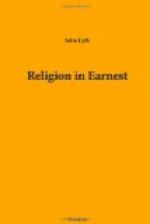Mary Burdsall was not indifferent to these opportunities. In the beginning of life she formed the habit of early rising. She rose with the lark and sang as merrily. She cultivated a taste for reading and reflection; and although the natural vivacity of her disposition was a constant snare in her path, she never lost sight of the purpose she had formed of living for God. In secret she communed with her own heart, and, the better to secure her growth in grace, commenced a diary, which, with two or three short intermissions, occasioned by sickness, was continued until within a week of her death. Unfortunately a considerable portion of these manuscripts, including a period of several years just preceding and following her marriage, were destroyed by her own hands. What remains, is however no small proof of her diligence and perseverance, as they extend to twenty quarto volumes containing about 5,000 pages. They contain, besides the record of her inner and outer life, copious summaries of the discourses she heard; numerous extracts from books, especially of passages calculated to impress the heart or direct the life; and an extraordinary amount of original verse; for from the first she appears to have adopted the practice of putting her thoughts into rhyme,—a practice which when unaccompanied by true genius is generally a profitless waste of time; but which in her case was made a valuable means of personal edification, as well as of administering counsel, consolation or admonition to others. Few events of public or private interest, in her own family or in the circle of her acquaintance, could pass without provoking her ready pen. Subjects poetical and unpoetical were alike constrained into measured lines; which, if not always remarkable for rhythm, were at least rich in evangelical sentiment, and pervaded by deep spirituality of thought. Some of these productions are inserted in this volume, in the order in which they occur in her diary, not because they possess any literary merit, but as eminently characteristic of her habits of thought and feeling. In fact they are transcripts of her own heart, and she seems often to have preferred this method of expressing her fervid emotions to the use of cooler prose.
A few examples of the entries made when she was fifteen will suffice to show what were the aspirations of her early youth:—
“This is the last day of 1797. O may I this day put off the works of darkness, and put on the armour of light: and begin a new life with a new year,—Lord, help me this day to live to Thee. Let Thy love be shed abroad in my heart. Inspire the spirit of prayer. Let my few days be spent in praising Thee, the Giver of all good gifts. Loose my heart from every earthly object, and let my affections be set upon Thee and things above. Lord, pardon my coldness, and help me in future to double my diligence to make my calling and election sure.—During service my mind was very much troubled; but glory be to God, He gave me, in a measure,




